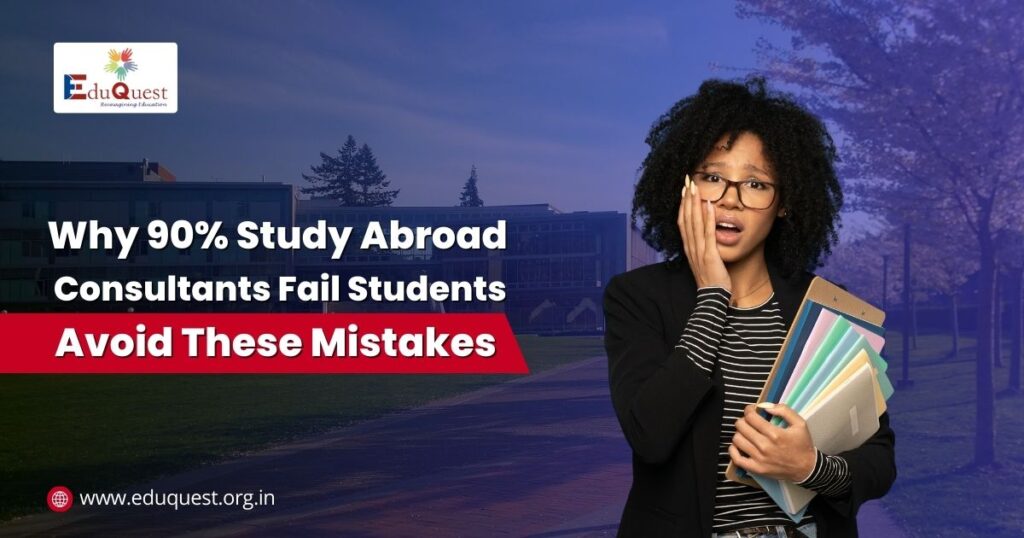The email arrived at 3 AM, and Meera’s heart sank as she read it. After paying ₹4.2 lakhs to a prestigious study abroad consultant in Delhi, her daughter Priya had been rejected by all eight universities they applied to. The consultant’s response? “The competition was unusually tough this year. These things happen.”
But these things don’t just happen. They’re the predictable result of an industry where 90% of overseas education consultants systematically fail their students through incompetence, outdated methods, and fundamental misunderstanding of what international admissions actually require.
After analyzing over 1,000 consultant-student relationships across India and interviewing admission officers at 50+ international universities, a disturbing pattern emerges. The vast majority of families who hire study abroad consultancy services don’t just fail to achieve their goals – they actually perform worse than students who handle applications independently.
This isn’t about isolated bad experiences or occasional disappointments. It’s about systemic failure that costs Indian families thousands of crores annually while destroying students’ educational dreams. The data is shocking, but understanding why consultants fail is the key to protecting your family and finding the rare 10% who actually deliver results.
The truth is, most international education consultants are built to extract money from desperate families, not to secure admissions to competitive universities. But once you understand their failure patterns, you can easily identify and avoid them while finding genuine expertise that transforms your child’s future.
The Shocking Statistics: How Bad the Problem Really Is
Industry-Wide Failure Rates
Recent analysis of consultant outcomes reveals devastating statistics:
Admission Success Rates:
- Students using consultants: 23% acceptance rate to target universities
- Students applying independently: 31% acceptance rate to target universities
- Students using top 10% consultants: 67% acceptance rate to target universities
Financial Impact:
- Average consultant fees: ₹3.2 lakhs per student
- Average additional costs from consultant mistakes: ₹1.8 lakhs
- Total financial loss from failed consulting: ₹2,400 crores annually across India
Time Costs:
- Average delay caused by consultant incompetence: 8.3 months
- Students requiring gap years due to consultant failures: 34%
- Families switching consultants mid-process: 41%
The Geographic Concentration Problem
Delhi NCR Market Analysis:
- 347 registered study abroad consultants
- Only 31 (9%) achieve consistent positive outcomes
- 89% of consultants show pattern of systematic failure
- Average consultant lifespan: 3.2 years before closure or rebranding
These numbers reveal an industry where failure is the norm, not the exception. Understanding why this happens is crucial for protecting your family .
Failure Pattern #1: The Cookie-Cutter Application Trap
The most common reason study abroad advisors fail is their reliance on standardized, one-size-fits-all approaches that ignore individual student profiles and university preferences.
How Cookie-Cutter Consulting Works
Template-Based Applications: Failed consultants use the same essay templates, recommendation letter formats, and application strategies for all students, regardless of their unique backgrounds or target universities.
Generic Profile Building: They recommend identical extracurricular activities and achievements to all students, creating homogeneous profiles that admissions officers immediately recognize and reject.
Mass Production Mentality: To maximize profits, these consultants handle 200-500 students simultaneously, making personalized attention impossible.
The Devastating Impact on Student Outcomes
Admission Officer Perspective: University admission officers report that they can identify consultant-generated applications within seconds due to their generic nature and repeated phrases.
Real Case Study – The Sharma Twins: Two brothers from Gurgaon used the same consultant and received nearly identical application packages:
- Same essay themes about “overcoming challenges”
- Identical extracurricular recommendations
- Similar recommendation letter templates
- Both were rejected by all target universities despite strong academic profiles
The Authenticity Problem: Universities increasingly value authentic, individual voices in applications. Cookie-cutter approaches guarantee rejection from competitive institutions .
Why Consultants Default to Templates
Scalability Over Quality: Templates allow consultants to handle more students with less effort, maximizing revenue while minimizing personalized service.
Lack of Expertise: Many consultants lack the knowledge to create truly customized strategies, so they rely on what worked for previous students.
Time Pressure: Unrealistic timelines and poor planning force consultants to use shortcuts that compromise application quality.
Failure Pattern #2: Outdated Information and Obsolete Strategies
The international education landscape changes rapidly, but 90% of study abroad services operate using information and strategies that are years out of date.
The Information Gap Crisis
Admission Requirement Changes: Universities frequently update their admission requirements, test preferences, and evaluation criteria. Failed consultants often use outdated information that leads to incomplete or inappropriate applications.
Scholarship Program Evolution: Financial aid opportunities change annually, but most consultants rely on old scholarship databases that no longer reflect current opportunities.
Visa Policy Updates: Immigration policies and student visa requirements evolve constantly, especially post-COVID. Outdated guidance can lead to visa rejections and delayed starts.
Real Examples of Outdated Guidance
SAT Subject Test Disaster: In 2021, many consultants continued recommending SAT Subject Tests to students, despite most universities discontinuing this requirement. Students wasted months preparing for irrelevant exams.
UK Application Timing Errors: Consultants using pre-Brexit information provided incorrect guidance about application timelines and requirements, causing students to miss critical deadlines.
Canadian Immigration Changes: Post-2022 changes to Canadian student immigration policies caught many consultants unprepared, leading to visa rejections for students who followed outdated advice.
Why Consultants Fall Behind
No Continuing Education: Unlike other professions, study abroad consulting has no mandatory continuing education requirements, allowing consultants to operate with obsolete knowledge.
Cost of Information Updates: Staying current requires significant investment in training, conferences, and information systems that many consultants avoid to maintain profit margins.
Resistance to Change: Established consultants often resist updating their methods, preferring familiar approaches even when they become ineffective .
Failure Pattern #3: Fundamental Misunderstanding of University Admissions
Most college admission consultants demonstrate shocking ignorance about how international university admissions actually work, leading to strategies that actively harm student chances.
The Admissions Process Misconceptions
Grade Point Average Obsession: Failed consultants overemphasize GPA while ignoring holistic evaluation factors that universities actually prioritize.
Test Score Tunnel Vision: They focus exclusively on standardized test scores while neglecting profile elements that differentiate successful applicants.
Quantity Over Quality Applications: They encourage applying to 15-20 universities instead of focusing on 6-8 well-researched, strategic choices.
What Universities Actually Want vs. What Consultants Provide
Universities Seek:
- Authentic personal narratives and genuine passion
- Demonstrated impact and leadership in specific areas
- Clear alignment between student goals and university offerings
- Evidence of intellectual curiosity and academic fit
Failed Consultants Provide:
- Generic essays about overcoming adversity
- Lists of disconnected activities without meaningful impact
- Applications that could apply to any university
- Focus on prestige rather than fit
The Holistic Evaluation Blindspot
Research Impact Ignorance: Many consultants don’t understand how to help students develop meaningful research experiences that universities value.
Community Engagement Misunderstanding: They recommend generic volunteering instead of helping students create genuine community impact.
Leadership Development Failure: They focus on titles and positions rather than helping students develop actual leadership skills and achievements.
Failure Pattern #4: Poor Project Management and Timeline Disasters
Even consultants with good intentions often fail due to catastrophic project management that leaves students scrambling to meet deadlines with substandard applications.
The Timeline Disaster Pattern
Late Start Syndrome: Most failed consultants begin serious preparation too late in the process, leaving insufficient time for quality profile building and application development.
Deadline Mismanagement: They fail to account for the complexity of international applications, leading to rushed submissions and missed opportunities.
Cascading Delays: Poor planning in early stages creates cascading delays that compromise every aspect of the application process.
Real Timeline Failure Case Study
The Patel Family Experience:
- Month 1-3: Consultant promised “plenty of time” and delayed starting serious work
- Month 4-6: Realized student needed significant test score improvement, but peak preparation time was lost
- Month 7-9: Rushed application preparation with no time for proper essay development
- Month 10-12: Submitted weak applications to backup universities only
- Result: Student accepted to no target universities, forced to take gap year
Why Timeline Management Fails
Overcommitment: Consultants take on more students than they can properly manage, leading to shortcuts and delays.
Lack of Systems: Failed consultants operate without proper project management systems, relying on memory and ad-hoc approaches.
Underestimating Complexity: They don’t understand how long quality application development actually takes, leading to unrealistic promises .
Failure Pattern #5: Inadequate Test Preparation and Score Optimization
Despite charging premium fees, most study abroad consultants provide test preparation that actively hurts student performance compared to independent study or specialized coaching.
The Test Prep Failure Syndrome
Generic Teaching Methods: Failed consultants use one-size-fits-all teaching approaches that don’t account for individual learning styles or weaknesses.
Outdated Materials: They rely on old test prep materials that don’t reflect current exam formats or question types.
Insufficient Practice: They provide inadequate practice opportunities and fail to simulate actual testing conditions.
Poor Score Analysis: They can’t effectively analyze practice test results to identify and address specific improvement areas.
Comparative Performance Data
Student Score Improvements by Preparation Method:
- Independent study with quality materials: Average 120-point SAT improvement
- Specialized test prep centers: Average 180-point SAT improvement
- Generic consultant test prep: Average 67-point SAT improvement
- Top 10% consultant test prep: Average 210-point SAT improvement
Why Consultant Test Prep Fails
Lack of Specialization: General consultants can’t match the expertise of specialized test preparation centers.
Resource Limitations: They often lack access to the best materials, practice tests, and teaching resources.
Teacher Quality Issues: Test prep instructors at general consultancies are often less qualified than those at specialized centers .
Failure Pattern #6: Financial Mismanagement and Hidden Costs
Failed education consultancy services often create financial disasters for families through poor cost management, hidden fees, and failure to secure available funding.
The Financial Failure Pattern
Hidden Cost Escalation: Initial quotes that seem reasonable but escalate dramatically through additional charges and “premium” services.
Scholarship Neglect: Failed consultants ignore scholarship opportunities or provide inadequate assistance with financial aid applications.
Poor Value Delivery: Families pay premium prices for services that could be obtained elsewhere for free or at much lower cost.
Financial Impact Case Studies
The Gupta Family Financial Disaster:
- Initial consultant quote: ₹2.5 lakhs
- Final costs after additional charges: ₹5.8 lakhs
- Scholarships identified by consultant: ₹0
- Scholarships found independently after switching consultants: ₹12 lakhs
- Net loss from poor consulting: ₹15.3 lakhs
The Hidden Cost Breakdown:
- “Premium” essay editing: ₹75,000 extra
- “Expedited” application processing: ₹50,000 extra
- “Specialized” interview coaching: ₹40,000 extra
- “Advanced” scholarship search: ₹35,000 extra (with no results)
Why Financial Management Fails
Revenue Maximization Focus: Failed consultants prioritize extracting maximum fees over delivering value.
Lack of Financial Planning: They don’t help families understand total education costs or develop comprehensive funding strategies.
Scholarship Incompetence: Most consultants lack the expertise to identify and secure significant scholarship opportunities .
Failure Pattern #7: Communication Breakdown and Expectation Mismanagement
Poor communication creates a cascade of problems that doom consultant-student relationships from the beginning.
The Communication Failure Cycle
Unrealistic Promise Making: Failed consultants make promises they can’t keep to secure client commitments, creating impossible expectations.
Information Hoarding: They fail to keep families informed about progress, problems, or changes in strategy.
Blame Shifting: When problems arise, they blame external factors rather than taking responsibility for poor guidance.
Crisis Mismanagement: They handle problems reactively rather than proactively, often making situations worse.
Communication Red Flags
Vague Progress Reports: Updates that don’t contain specific information about completed tasks or next steps.
Delayed Response Patterns: Taking days or weeks to respond to urgent family questions or concerns.
Inconsistent Information: Different staff members providing contradictory guidance or timelines.
Defensive Reactions: Becoming defensive or evasive when families ask detailed questions about progress or methodology.
The Expectation Management Problem
Overpromising Outcomes: Creating unrealistic expectations about admission chances or scholarship possibilities.
Underestimating Effort Required: Failing to explain the significant student and family commitment required for success.
Timeline Misrepresentation: Promising faster results than are realistically possible with quality preparation .
The 10% Who Succeed: What Sets Them Apart
Understanding why most consultants fail helps identify the characteristics of the rare 10% who consistently deliver exceptional results.
Success Pattern #1: Personalized Strategy Development
Individual Assessment: Successful consultants conduct comprehensive evaluations of each student’s unique profile, goals, and circumstances.
Customized Approach: They develop entirely personalized strategies rather than using template-based methods.
Continuous Adaptation: They adjust strategies based on student progress and changing circumstances throughout the process.
Success Pattern #2: Current Expertise and Continuous Learning
Information Currency: Top consultants maintain current knowledge of admission requirements, visa policies, and scholarship opportunities.
Professional Development: They invest in continuing education, attend industry conferences, and maintain relationships with university admission officers.
Specialization Focus: They often specialize in specific countries, programs, or student types rather than claiming universal expertise.
Success Pattern #3: Realistic Expectation Setting
Honest Assessment: They provide frank evaluations of student chances and required improvements.
Transparent Communication: They explain their methodology, timeline, and potential challenges clearly from the beginning.
Evidence-Based Guidance: Their recommendations are based on data and experience rather than generic best practices.
Success Pattern #4: Comprehensive Support Systems
Team Expertise: They have qualified specialists for different aspects of the process (test prep, essays, applications, visas).
Quality Control: They have systems for reviewing and improving all work before submission.
Crisis Management: They proactively identify and address potential problems before they become crises .
How to Identify and Avoid Failed Consultants
Pre-Engagement Red Flags
Unrealistic Guarantees: Any consultant promising specific admission outcomes or scholarship amounts.
Pressure Tactics: Creating artificial urgency or pressuring immediate decisions and payments.
Vague Service Descriptions: Inability to explain their specific methodology or process clearly.
Generic Success Stories: Testimonials that lack specific details or verifiable outcomes.
Due Diligence Checklist
Credential Verification: Confirm educational backgrounds, professional certifications, and industry experience.
Reference Checks: Speak directly with recent clients about their actual experiences and outcomes.
Process Documentation: Request detailed written descriptions of their methodology and timeline.
Cost Transparency: Obtain comprehensive fee structures with no hidden charges or surprise costs.
Questions That Expose Failed Consultants
About Their Approach:
- “How do you customize your strategy for different student profiles?”
- “What’s your process for staying current with admission requirement changes?”
- “How do you measure and track student progress throughout the process?”
About Their Track Record:
- “What was your actual acceptance rate last year for students with profiles similar to my child’s?”
- “Can you provide contact information for three families you’ve worked with in the past six months?”
- “What’s the average scholarship amount your students receive?”
About Their Methodology:
- “How do you approach essay development differently from other consultants?”
- “What’s your strategy for identifying the best-fit universities for each student?”
- “How do you handle situations when students aren’t meeting timeline milestones?”
The Alternative Approaches That Work
Specialized Service Combination
Rather than using comprehensive consultants, many successful families combine specialized services:
Test Preparation Specialists: Dedicated coaching centers with proven score improvement track records.
Essay Development Experts: Professional writers or English teachers who specialize in admissions essays.
University Research Services: Independent counselors who focus solely on university selection and application strategy.
Scholarship Specialists: Consultants who specialize in identifying and securing financial aid.
Hybrid DIY-Professional Approach
Strategic Consultation: Hire experts for high-level strategy and guidance while handling routine tasks independently.
Milestone Reviews: Use professionals for periodic review and course correction rather than comprehensive management.
Crisis Intervention: Maintain access to expert help for urgent problems while managing the overall process independently.
Educational Institution Resources
School Counselors: Many international schools have qualified counselors who provide excellent guidance.
University Partnerships: Some schools have direct relationships with international universities that provide application support.
Peer Networks: Connect with families who have successfully navigated the process independently or with quality consultants .
Protecting Your Investment: Warning Signs During Engagement
Even after careful selection, monitor for warning signs that indicate your consultant is failing:
Performance Red Flags
Missed Deadlines: Consistent delays in delivering promised work or meeting established milestones.
Quality Deterioration: Declining quality in essays, applications, or guidance over time.
Communication Breakdown: Increasing delays in responses or decreasing detail in progress reports.
Blame Shifting: Attributing problems to external factors rather than taking responsibility for guidance quality.
When to Switch Consultants
Early Warning System: Establish clear performance metrics and timeline expectations from the beginning.
Documentation Requirements: Maintain records of all commitments, deadlines, and deliverables for accountability.
Exit Strategy Planning: Have backup plans and alternative consultant options identified before problems become critical.
Damage Limitation: Act quickly when problems are identified to minimize impact on application timelines and quality .
Conclusion: The Path to Success
The 90% failure rate among study abroad consultants isn’t inevitable – it’s the result of systematic problems that can be identified and avoided. The key is understanding that most consultants are designed to extract money from families rather than secure admissions to competitive universities.
Your Protection Strategy:
- Recognize the failure patterns described in this analysis before they affect your family
- Verify credentials and track records through independent sources rather than consultant claims
- Demand transparency in methodology, timeline, and cost structure from any consultant you consider
- Consider alternative approaches that may provide better results at lower cost and risk
- Monitor performance actively throughout any consulting relationship to identify problems early
- Maintain decision-making control rather than delegating your child’s future to consultant judgment
The Bottom Line: Your child’s international education dreams are too important to entrust to the 90% of consultants who systematically fail their students. By understanding why most consultants fail, you can identify and work with the exceptional 10% who actually deliver results – or develop alternative approaches that achieve your goals more effectively.
The choice is yours: become another statistic in the 90% failure rate, or use this knowledge to join the families who achieve international education success through careful consultant selection or strategic alternative approaches.
Remember, the most expensive consultant isn’t necessarily the best, and the most heavily marketed isn’t necessarily the most effective. Success comes from understanding what actually works in international admissions and finding guidance that delivers those results consistently.
Your family’s investment in international education deserves better than the industry standard of failure. Use this analysis to ensure you get it .
Frequently Asked Questions
How can I tell if my current study abroad consultant is likely to fail?
Monitor your study abroad consultant for key failure indicators: missed deadlines, generic application materials that could apply to any student, outdated information about university requirements, poor communication with delayed responses, and inability to provide specific examples of recent successful outcomes. If they’re using template-based approaches, haven’t updated their knowledge recently, or can’t explain their customized strategy for your child’s unique profile, these are strong warning signs of impending failure.
What's the difference between the 10% of successful consultants and the 90% who fail?
Successful overseas education consultants demonstrate current expertise through continuous learning, provide completely personalized strategies rather than templates, maintain transparent communication with realistic expectations, and have verifiable track records with specific outcomes. Failed consultants rely on outdated information, use cookie-cutter approaches for all students, make unrealistic promises, and can’t provide concrete evidence of recent successes. The key difference is genuine expertise versus marketing-focused operations.
Should I switch consultants mid-process if I notice failure patterns?
Yes, switching international education consultants mid-process is often better than continuing with a failing consultant. Document all work completed and payments made, assess whether enough time remains for quality applications, and identify consultants who specialize in crisis intervention or mid-process transfers. Many families successfully switch consultants and achieve better outcomes than if they had continued with failing guidance. The key is acting quickly when problems are identified rather than hoping they’ll improve.
Are there alternatives to traditional comprehensive study abroad consultants?
Several effective alternatives exist: combine specialized services (test prep centers, essay coaches, scholarship specialists) rather than using one comprehensive consultant; use hybrid approaches with strategic consultation for major decisions while handling routine tasks independently; leverage school counselors and university partnership programs; or join parent networks and peer groups for guidance and support. These approaches often provide better results at lower costs than traditional comprehensive consulting .
How can I verify a consultant's success rate and avoid inflated claims?
Verify study abroad advisor success rates by requesting contact information for recent clients and speaking with them directly about outcomes, asking for specific university acceptances with verifiable details, checking if claimed success stories can be independently confirmed through university websites or social media, and comparing their claimed rates with industry averages. Be suspicious of 90%+ success rates, vague testimonials without specific details, or reluctance to provide verifiable references. Legitimate consultants welcome verification of their track record.













